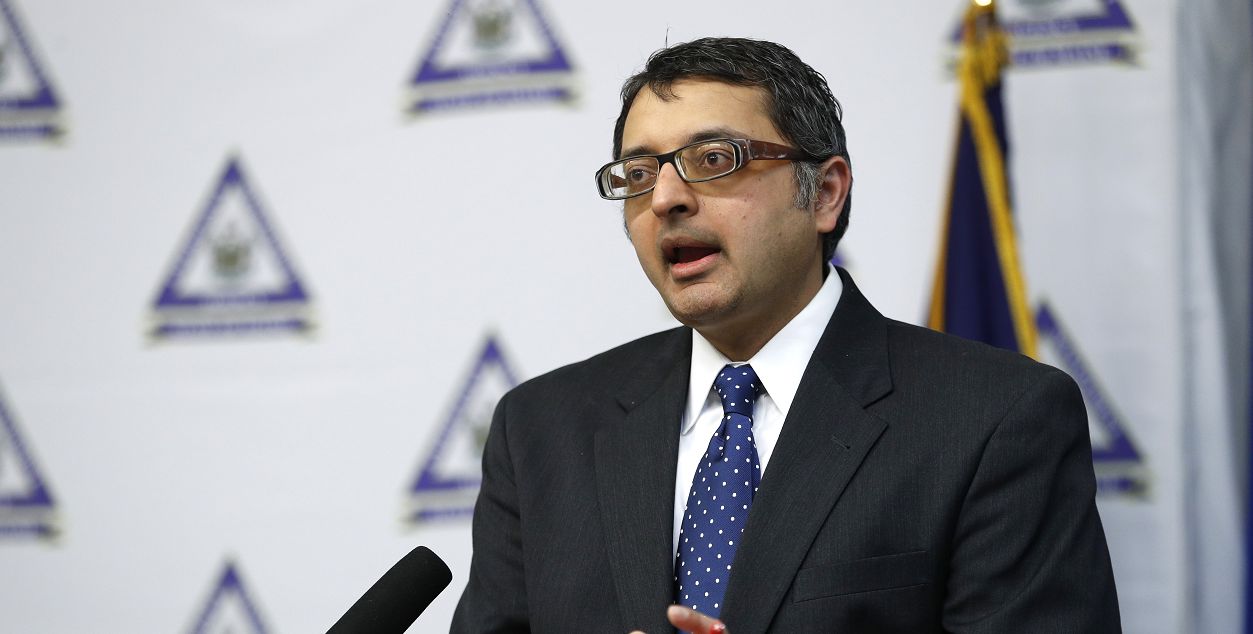Maine is seeing some positive trends in the spread of the COVID-19 pandemic, but state officials say it’s too soon to know whether the state is past its peak of the omicron variant.
At his weekly press conference Wednesday, state Center for Disease Control and Prevention director Dr. Nirav Shah said hospitalizations, severe illness, positive test rates and incoming numbers of positive test results have all dropped in the past week or two, easing some strain on still-overburdened hospitals and offering reasons for cautious optimism.
“We've been here before in some respects, and we may be here again. COVID is down, but it may not be out,” he said. “We're going to have to set up systems, which we are doing, that help us figure out how we move out in the long-term.”
Those systems include new data from wastewater screening, which will show the prevalence of antibodies in Maine in the coming weeks. Preliminary results show a reduction in COVID-19 levels, Shah said, on par with — or even beyond — those in hospitalizations and other metrics.
“These are things that’ll help us detect if we ever are in the midst of another surge again,” he said. “The signs are optimistic, but we still have to plan for the possibility of a resurgence at some point.”
The state currently has a backlog of 58,000 COVID-19 lab results, meaning those cases have yet to be added to daily reports of new infections. People who test positive are notified by their test provider, but the state is behind on adding those tests to their records.
For this reason, Shah said that the number of new lab results submitted to the state every day is a better way to judge the trend in cases. That’s one of the numbers that has dropped in recent days. Shah said current hospitalizations and positive test rates may also be lower than their record highs of recent weeks, but are still higher than at almost any other point in the pandemic.
Shah announced Wednesday that Maine would cease contact tracing for COVID-19 on Feb. 8, next Tuesday. The program has been in place since early in the pandemic and was used to identify close contacts of people with COVID-19 who needed to quarantine or be tested.
He said the reasons to end the program for the coronavirus were the same as when the state said recently it would suspend contact tracing in schools: because omicron is more contagious than past iterations of the virus, and people exposed to it become contagious more quickly.
“Contact tracing is based on the idea that public health agencies can identify a positive case, get their close contacts, reach out to those close contacts and advise them to quarantine, all before that close contact has a chance to infect and spread COVID to others,” Shah said. “But the biology of the omicron variant is such that contact tracing doesn't get to those folks fast enough.”
Shah said this should not change many aspects of how people approach the virus: if you’re infected, stay home and notify your own close contacts, meaning anyone you were with for more than 15 minutes and within six feet, for two days before you felt sick or tested positive.
“If you get a call from a friend who you had lunch with the other day, who calls to tell you they now have COVID and that you are a close contact, you should quarantine if you are not up to date on your vaccinations – namely, if you haven't gotten your booster,” Shah said. “The need to quarantine does not change with today's announcement. What does change is that it won't be, necessarily, Maine CDC who's calling you to inform you that you are a close contact.”
Shah said the state will continue contact tracing for COVID-19 in certain settings, such as jails, hospitals and nursing homes. Tracing will also continue for other slower-moving illnesses, such as tuberculosis and sexually transmitted infections, where it’s long been common practice.
State health commissioner Jeanne Lambrew said 8,500 at-home COVID-19 test kits have been delivered to eligible Mainers in recent days under a pilot program launched last week. Another 30,000 are in transit as of Wednesday, she said, accounting for about a quarter of the kits the state procured. They’re offered to about a quarter of zip codes in the state.
Eligible residents can sign up to receive a set of these five tests at www.accesscovidtests.org. Four additional free tests per residential address are also still available through the U.S. Postal Service at www.covidtests.gov.




